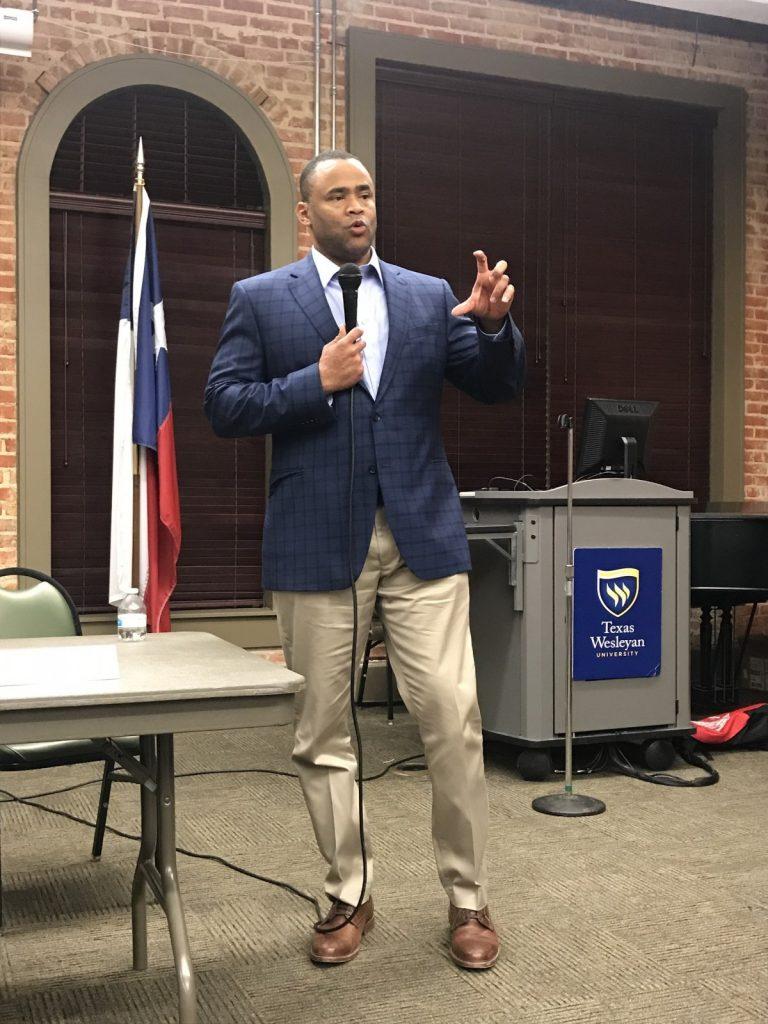Congressman Marc Veasey, along with a panel of speakers, discussed mental health issues and services among veterans at a town hall meeting in the Baker Building Thursday.
“Every year around Veterans Day, we do a presentation, a veteran’s town hall and an awards program to give veterans who served our country an opportunity to come and express what issues are important to them,” Veasey said. “This is something I take very seriously.”
The panel consisted of Veasey and Dr. Stephen Holt from VA of North Texas, Shalaina Abioye from Catholic Charities of Fort Worth, Mark Ware from My Health My Resources, Tempa Sherill from 22Kill and Aqueelah Collier, a licensed clinical therapist.
Audience member Annette Roundtree, who works for Dallas County Community College, said she works with veterans who come out of the military but her school, like many other schools in the area, is not offering enough services and counselors.
“I had one student who came in when I started working for the school,” Roundtree said. “I remember that student coming in, I will not say a name, and I knew something was wrong that day, but I couldn’t get to him because I had all these other students I had to process.”
That student went home and killed his ex-wife, her lover and himself, Roundtree said. Counselors who understand veterans’ issues and can properly counsel them are needed on college campuses.
“We have no counselors at these schools from UTA to Dallas Community College to probably Texas Wesleyan that is a veterans’ counselor,” she said. “We are probably one of the first people that see them because they are looking for funding and we are going to lose them because we can’t save them all. We need your help and the schools need your help.”
Ware told Roundtree that she, as well as everyone in the community, is a part of a safety net in recognizing symptoms and helping veterans getting connected to services.
“The key is you,” Ware said. “You are going to see them before we do but you need to pick up the phone or encourage them to pick up the phone to call us, so we can get services to them. If that person is wanting services, they can get services 24/7, 365 days a year here in Tarrant County.”
Collier told Roundtree that if she is the first responder dealing with a veteran who needs to connect with a fellow veteran who is also a clinician, she is available, and she will come to the school.
“I will work with you to meet the needs of those veterans,” Collier said. “I hear what you are saying, and I am reaching out to you now.”
Eladio Martinez, a veteran who lives in West Dallas, asked the panelists about services being offered to homeless veterans.
“We actually have probably nine outpatient clinics for adults throughout the county,” Holt said. “One of which is a homeless clinic which deals specifically with the homeless.”
Martinez asked about veterans who do not have family members or spouses to help them and what they can do in times of need.
“All veterans, they don’t have anybody to help them,” Martinez said. “They are by themselves, they shrink up and just go under a bridge and they don’t have any help. That is what I am looking for, that maybe they can get some help.”
Holt said there are programs with outreach to those veterans, but they are limited.
“We are doing what we can, but we could always be doing more,” Holt said.
Sherill addressed Veasey and told him that many women veterans are struggling with homelessness.
“As a provider, we find that services for women veterans who are in danger of, or are already, homeless are very difficult to find,” Sherill said. “It is a huge need. We are not doing enough.”
Four veterans received a Congressional Veterans Commendation that recognizes wartime sacrifices and peacetime community involvement of veterans in Texas’ Congressional District 33. The winners were Abdel Casiano, David Whitley, Jherrard Crockett and Christopher Ray, a student at Texas Wesleyan and member of the Student Veterans of America.
Crockett said it is very important to address these topics in the veteran community.
“As a veteran, I think it is very important to bring up these topics to address these in a proper way,” Crockett said. “Thank you to the panel to being here to hear what we have to say and understand the seriousness of what we need.”

Photo by Hannah Lathen

Photo by Hannah Lathen

Photo by Hannah Lathen









![Pippin, played by Hunter Heart, leads a musical number in the second act of the musical. [Photo courtesy Kris Ikejiri]](https://therambler.org/wp-content/uploads/2025/04/Pippin-Review-1200x800.jpg)
![Harriet and Warren, played by Trinity Chenault and Trent Cole, embrace in a hug [Photo courtesy Lauren Hunt]](https://therambler.org/wp-content/uploads/2025/02/lettersfromthelibrary_01-1200x800.jpg)
![Samantha Barragan celebrates following victory in a bout. [Photo courtesy Tu Pha]](https://therambler.org/wp-content/uploads/2025/05/20250504_164435000_iOS-834x1200.jpg)





![Hunter Heart (center), the play's lead, rehearses a scene alongside other student actors. [Photo courtesy Jacob Sanchez]](https://therambler.org/wp-content/uploads/2025/04/thumbnail_IMG_8412-1200x816.jpg)
![Student actors rehearse for Pippin, Theatre Wesleyan's upcoming musical. [Photo courtesy Jacob Rivera-Sanchez]](https://therambler.org/wp-content/uploads/2025/04/Pippin-Preview-1200x739.jpg)
![[Photo courtesy Brooklyn Rowe]](https://therambler.org/wp-content/uploads/2025/05/CMYK_Shaiza_4227-1080x1200.jpg)

![Lady Rams softball wraps up weekend against Nelson Lions with a victory [6 – 1]](https://therambler.org/wp-content/uploads/2025/04/Screenshot-2025-04-04-100924-1200x647.png)















